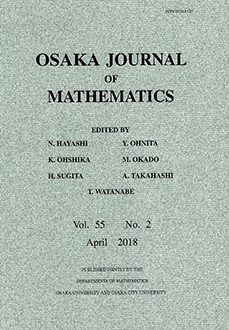Abstract
Shinji Miura gave certain multivariable polynomials that express an Affine curve for a given algebraic function field $F$ and its degree one place $\mathcal{O}$, if $F$ contains such an $\mathcal{O}$. Suppose the equations contain $t$ ($\geq 2$) variables, and that the pole orders at $\mathcal{O}$ are $a_1,\ldots,a_t \geq 1$, where $\operatorname{GCD}\{a_1,\ldots,a_t\}=1$. If \[ \frac{a_i}{d_i} \in \frac{a_1}{d_{i-1}}{\mathbb N}+ \cdots +\frac{a_{i-1}}{d_{i-1}}\mathbb{N}, \quad d_i=\operatorname{GCD}\{a_1,\ldots,a_{i}\} \] for each $i=2,\ldots,t$, by arranging $a_1,\ldots,a_{t}$, then we say that the orders $a_1,\ldots,a_{t}$ are telescopic. On the other hand, the number $t'$ ($\geq t-1$) of the equations in the Miura canonical form is determined by $a_1,\ldots,a_{t}$. If $t'=t-1$, then we say that $a_1,\ldots,a_{t}$ are complete intersection. It is known that the telescopic condition implies the complete intersection condition. However, the converse was open thus far. This paper solves the conjecture in the affirmative by giving its proof.
Citation
Joe Suzuki. "Miura conjecture on Affine curves." Osaka J. Math. 44 (1) 187 - 196, March 2007.
Information





